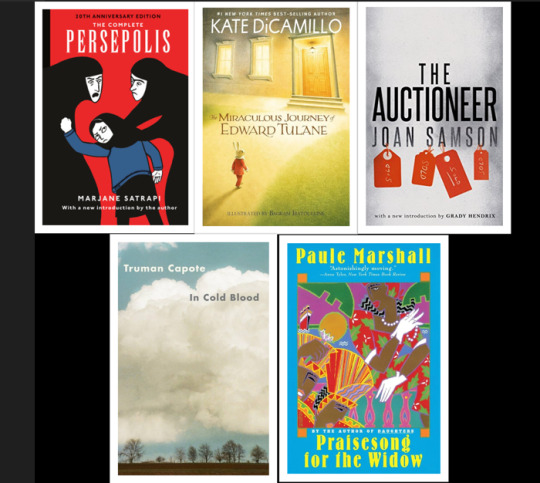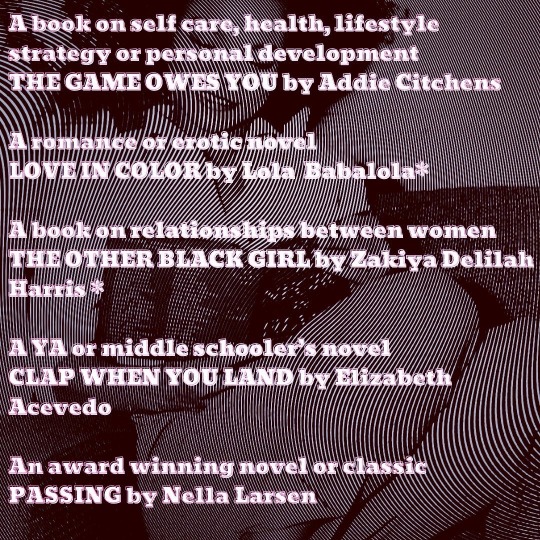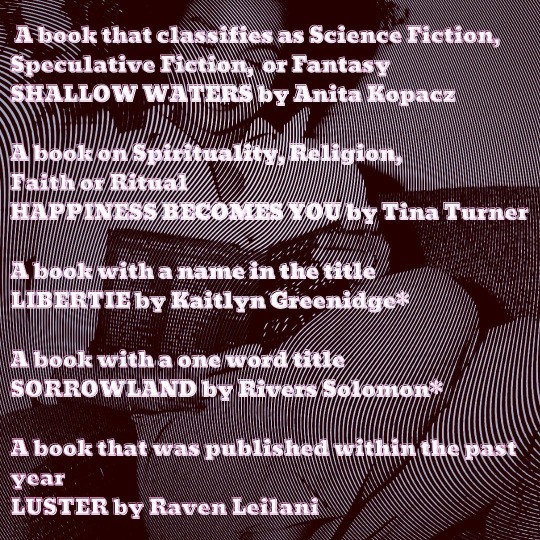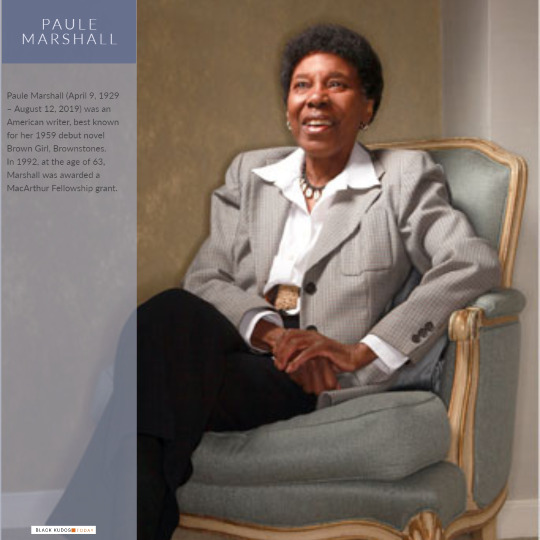#praisesong for the widow
Text
April 2024 Book Club

Persepolis by Marjane Satrapi: In 1979, Marjane Satrapi turned ten years old, living in Tehran. The same year, the Iranian revolution swept through the country, installing a new ultra-conservative government that clashed with Satrapi's loving, progressive family. As Satrapi chafed under the regime, her parents realized that the country was no longer safe for her and send her to Austria, where she must deal with the culture shock and the trauma of what she experienced on her own.
The Miraculous Journey of Edward Tulane by Kate DiCamillo: Edward Tulane is a china rabbit, of fine craftsmanship and quality, and he knows it. There's not much Edward loves than himself, not even his loving owner. But when Edward is separated from her during a family trip, he's taken on a whirlwind adventure to understand what love really means.
The Auctioneer by Joan Samson: Harlowe, New Hampshire is a town that seems forgotten by the ever-changing world around it, and its residents like that just fine. After all, the world outside Harlowe is dangerous and cruel. Not like the wholesome peace they have. So when a smooth-talking auctioneer named Perly Dinsmore proposes an auction to benefit the police force that keep Harlowe safe from that dangerous outside world, they're more than happy to contribute. But then Perly asks for more. Each week, Perly comes by again to solicit donations, and things slowly and insidiously begin to change. And when the citizens of Harlowe have nothing material left to give, Perly will find other things they can contribute. "Whatever I've done, you let me do."
In Cold Blood by Truman Capote: On November 15, 1959, in the small town of Holcomb, Kansas, four members of the Clutter family were savagely murdered by blasts from a shotgun held a few inches from their faces. There was no apparent motive for the crime, and there were almost no clues. Hundreds of miles away, recently paroled convicts Dick Hickock and Perry Smith made their way towards Mexico, certain that the terrible crime they committed would never be linked to them. As evidence comes to light and the police start closing in, Capote chronicles the details of the lives of the victims, their murderers, and their neighbors as the quintessential story of American violence unfolds and comes to a stormy head.
Praisesong for the Widow by Paula Marshall: In the dead of night Avey Johnson - a black, middle-aged widow given to hats, gloves, and pearls - leaves a cruise she was on with two friends, determined to get home again after a troubling dream. She's left her childhood of Harlem and Gullah songs behind her, and she longs to get back to the world that makes her feel secure. But when she disembarks on the island of Grenada, she finds herself swept up in a homecoming festival for the people of Curacao, where she will discover what coming home really means.
#book club#april 2024#persepolis#marjane satrapi#the miraculous journey of edward tulane#kate dicamillo#the auctioneer#joan samson#in cold blood#truman capote#praisesong for the widow#paula marshall
0 notes
Quote
He was one of those old people who give the impression of having undergone a lifetime trial by fire which they somehow managed to turn to their own good in the end; using the fire to burn away everything in them that could possibly decay, everything mortal. So that what remains finally are only their cast-iron hearts, the few muscles and bones tempered to the consistency of steel needed to move them about, the black skin annealed long ago by the sun's blaze and thus impervious to all other fires; and hidden deep within, out of harm's way, the indestructible will: old people who have the essentials to go on forever.
Paule Marshall, from Praisesong for the Widow
#Paule Marshall#Praisesong for the Widow#quote#quotes#lit#literature#wisdom#storytelling#stories#story#bookofkhidr#book of khidr
6 notes
·
View notes
Text







2021 TFBWL Reading Challenge Wrap Up!! 📚📚📚🎉🎉🎉🎉🍾🍾🍾
Shout to all my book buddies all over the world who took part in this year’s Reading Challenge for The Free Black Women’s Library.
Our goal was to read at least 20 books of varying genres and subject matter written by Black women or Black non binary folks in one year. I read 30!! 😮
I’m seriously impressed with myself!!
I know being part of a Reading Club and having a spreadsheet to keep track of my progress throughout the year definitely helped.
After three years of doing this challenge, I think this is my most successful reading year yet.
I read a total of 40 books in 2021 and I actually enjoyed most of them. Almost all except one tbh.
Posted here are the books I read for the challenge specifically. 🖤📚
The ones with * are books we read in TFBWL Reading Club, the ones with ^ were my audio reads.
1.A vintage Black Feminist or Womanist text (published before 2000): SISTERS OF THE YAM by bell hooks
2. A contemporary Black Feminist or Womanist text (published between 2000 & now): UNDROWNED by Alexis Pauline Gumbs*
3. LGBTQ author and/or content - fiction: GILDA STORIES by Jewelle Gomez
4.LGBTQ author and/or content - nonfiction: DEAR SENTHURAN by Akwaeke Emezi
5. A book by a revolutionary, community activist, political organizer, or abolitionist: UNBOUND by Tarana Burke
6. A book on self-care, health, lifestyle strategy, or personal development: THE GAME OWES YOU by Addie Citchens
7. A romance or erotic novel: LOVE IN COLOR by Bolu Babalola*
8. A book that centers relationships between women: THE OTHER BLACK GIRL by Zakiya Dalila Harris*
9. A young adult or middle schooler’s novel: CLAP WHEN YOU LAND by Elizabeth Acevedo
10. An award-winning novel and/or classic: PASSING by Nella Larsen
11. A debut or famous author’s first: WHEN THE RECKONING COMES by LaTanya McQueen
12. Any book by Octavia Butler: KINDRED
13. Any book by Toni Morrison: PLAYING IN THE DARK/WHITENESS & THE LITERARY IMAGINATION
14. A book by a Caribbean author: PRAISESONG FOR THE WIDOW by Paule Marshall
15. A book by an African author: WOMEN ARE DIFFERENT by Flora Nwapa
16. A book that classifies as Science Fiction, Speculative Fiction, or Fantasy: SHALLOW WATERS by Anita Kopacz
17. A book on Spirituality, Religion, Faith or Ritual: HAPPINESS BECOMES YOU by Tina Turner
18. A book with a name in the title: LIBERTIE By Kaitlyn Greenidge*
19. A book with a one-word title: SORROWLAND by Rivers Solomon*
20. A book that was published within the past year: LUSTER by Raven Leilani
21. A graphic novel or series of comic books: WAKE/THE HIDDEN HISTORY OF WOMEN-LED SLAVE REVOLTS by Rebecca Hall
22. A memoir or autobiography: SOMEBODY’S DAUGHTER by Ashley C. Ford*
23. A book where characters speak Patois, Creole, Geechee, or AAVE: FRYING PLANTAIN by Zalika Reid-Benta
24. A collection of poetry, short stories, essays or prose: TOO MUCH MIDNIGHT by Krista Franklin
25. A book on Body Politics, Trauma, Autonomy or Acceptance: FEARING THE BLACK BODY/THE RACIAL ORIGINS OF FAT PHOBIA by Sabrina Strings
26. A book on Migration, Travel, Location or Place - fiction or nonfiction: MULES AND MEN by Zora Neale Hurston
27. A book on Disability or Neurodivergence - fiction or nonfiction: Black Madness/Mad Blackness by Theri Alyce Pickens
28. History, Historical Fiction or Slave Narrative: WAYWARD LIVES/BEAUTIFUL EXPERIMENTS by Saidiya Hartman
29. A book that takes place in your hometown: SEVEN DAYS IN JUNE by Tia Williams
30. A book on parenting or child advocacy: CAUL BABY by Morgan Jerkins
I will be posting more about my faves of the year on my Patreon
85 notes
·
View notes
Text
Paule Marshall

Paule Marshall (April 9, 1929 – August 12, 2019) was an American writer, best known for her 1959 debut novel Brown Girl, Brownstones. In 1992, at the age of 63, Marshall was awarded a MacArthur Fellowship grant.
Life and career
Marshall was born Valenza Pauline Burke in Brooklyn, New York, to Adriana Viola Clement Burke and Sam Burke on April 9, 1929. Marshall's father had migrated from the Caribbean island of Barbados to New York in 1919 and, during her childhood, deserted the family to join a quasi-religious cult, leaving his wife to raise their children by herself. Marshall wrote about how her career was inspired by observing her mother's relationship to language: "It served as therapy, the cheapest kind available to my mother and her friends. It restored them to a sense of themselves and reaffirmed their self-worth. Through language they were able to overcome the humiliations of the work day. Confronted by a world they could not encompass, they took refuge in language." Smitten with the poet Paul Laurence Dunbar, Marshall changed her given name from Pauline to Paule (with a silent e) when she was 12 or 13 years old.
She attended Girls' High School in Bedstuy and subsequently enrolled in Hunter College, City University of New York, with plans of becoming a social worker. She took ill during college and took a year off, during which time she decided to major in English Literature, eventually earning her Bachelor of Arts degree at Brooklyn College in 1953 and her master's degree at Hunter College in 1955. After graduating from college, Marshall wrote for Our World, the acclaimed nationally distributed magazine edited for African-American readers, which she credited with teaching her discipline in writing and eventually aiding her in writing her first novel, Brown Girl, Brownstones. In 1950 she married psychologist Kenneth Marshall; they divorced in 1963. In the 1970s she married Nourry Menard, a Haitian businessman.
Early in her career, she wrote poetry, but later returned to prose, her debut novel being published in 1959. Brown Girl, Brownstones tells the story of Selina Boyce, a girl growing up in a small black immigrant community. Selina is caught between her mother, who wants to conform to the ideals of her new home and make the American dream come true, and her father, who longs to go back to Barbados. The dominant themes in the novel – travel, migration, psychic fracture and striving for wholeness – are important structuring elements in her later works as well.
She received a Guggenheim Fellowship in 1961 and in the same year published Soul Clap Hands and Sing, a collection of four novellas that won her the National Institute of Arts Award. In 1965, she was chosen by Langston Hughes to accompany him on a State Department-sponsored world tour, on which they both read their work, which was a boon to her career. She subsequently published the novels The Chosen Place, the Timeless People (1969), which the New York Times Book Review called "one of the four or five most impressive novels ever written by a black American", and Praisesong for the Widow (1983), the latter winning the Before Columbus Foundation American Book Award in 1984.
Marshall taught at Virginia Commonwealth University, the University of California, Berkeley, the Iowa Writers' Workshop, and Yale University, before holding the Helen Gould Sheppard Chair of Literature and Culture at New York University. In 1993 she received an honorary L.H.D. from Bates College. She lived in Richmond, Virginia.
She was a MacArthur Fellow and a winner of the Dos Passos Prize for Literature. She was designated as a Literary Lion by the New York Public Library in 1994.
Marshall was inducted into the Celebrity Path at the Brooklyn Botanic Garden in 2001.
Her memoir, Triangular Road, was published in 2009.
In 2010, Paule Marshall won a Lifetime Achievement Award from the Anisfield-Wolf Book Awards. She died in Richmond, Virginia on August 12, 2019, having had dementia in her later years.
Works
Brown Girl, Brownstones (Random House, 1959; The Feminist Press, 1981)
Soul Clap Hands and Sing (four short novels; Atheneum, 1961)
The Chosen Place, the Timeless People (Harcourt, 1969)
Reena and Other Stories (The Feminist Press at CUNY, 1983)
Praisesong for the Widow (Putnam, 1983)
Merle: A Novella, and Other Stories (Virago Press, 1985)
Daughters (Atheneum, 1991)
The Fisher King: A Novel (2001)
Triangular Road: A Memoir (Basic Civitas Books, 2009)
Quote
"I realise that it is fashionable now to dismiss the traditional novel as something of an anachronism, but to me it is still a vital form. Not only does it allow for the kind of full-blown, richly detailed writing that I love… but it permits me to operate on many levels and to explore both the inner state of my characters as well as the worlds beyond them."
3 notes
·
View notes
Quote
With a strength born of the decision that had just come to her in the middle of the night, Avery Johnson forced the suitcase shut on the clothes piled inside and slid the lock in place.
Praisesong for the Widow, Paule Marshall
#praisesong for the widow#paule marshall#marshall#b#opening sentence#decision#avery johnson#suitcase#leaving
0 notes
Text
30 Day Book Challenge - Day 5
A book that makes you happy - Praisesong for the Widow by Paule Marshall

“With a strength born of a decision that had just come to her in the middle of the night, Avey Johnson forced the suitcase shut on the clothes piled inside and slid the lock into place.”
0 notes
Text
Paule Marshall
youtube
Paule Marshall was born in Brooklyn, New York in 1929. In 1959, Marshall published her first novel, Brown Girl, Brownstones. In 1961, she published Soul Clap Hands and Sing, a collection of four novellas. Marshall gained widespread recognition and acclaim in the 1980s, with the reprint of her debut novel in 1981, and the publication of her 1983 novel Praisesong for the Widow. Over the course of her writing career, she has won the American Book Award, the Langston Hughes Medallion Award, and a MacArthur Fellowship.
8 notes
·
View notes
Text
Style Notebook 16
I value the theoretical lens of race and postcolonialism. I am choosing to use both of these because they fit so well together like two pieces of a puzzle piece. I think it is really important to look at things from a race point of view so that we can see things from several different perspectives. If we look at things with both of these theoretical lenses then we are more mindful of why a person may be doing something especially if they don't "fit" within the white agenda. When looking at Praisesong of the Widow it is important to understand both of these lenses so that we can better understand the character of Avey and why she makes some of the decisions that she does. Looking at the flashback of when Avey is with her aunt it is important to look at it from both lenses so that you can better understand why that story is important to the character. A key concept of postcolonialism is that we are seeing all of the consequences of the act of colonizing a place. We can see the negative effects of trying to colonize these people of color and getting them to work on plantations by seeing that we are dehumanizing them and telling them that they aren't human, they are property. This thought process shows us that the colonizers discredited these people's culture and way of life. Someone could take it a step further use the race and postcolonialism lenses together to see that the people were discredited in everything that they did. These people were then expected to behave themselves and to work without any reservations because these people were not seen as people but as livestock to be overworked, bred, and kept in dismal living conditions like they are cattle. Using the postcolonial lens we can look back and see the errors of this way of thinking and hopefully never repeat those actions or ways of thinking. Something to point out is that despite people saying that they aren't racist, this country is very much still racist which breaks my heart because I just want everyone to be treated with love and acceptance no matter what because when it comes down to it, we all bleed red.
0 notes
Photo

Paule Marshall has died. Oh, how I loved her novels. She brought Caribbean immigrants lives in New York City to the forefront of our imagination. She highlighted our passion, our intricate lives that we never reveal to others, and our longing for home - the one we immigrated from and the one we were stolen from. I remember taking a #blackwomenwriters with @eisaulen at @huntercollege and reading two of Marshall’s novel #browngirlbrownstones and Praisesong For A Widow. After class, I’d rush home to my flat where I shared with my beloved friend Dionne, and tell her everything I learned about the novels, it’s ideas, Caribbean identity, and literature. Marshall informer my writing life and my ability to go beyond the margins. She was the original #blackgurlmagic and #browngirlbooklover and #booklover. Thanks for being our lives, aunty Marshall. Thanks for teaching us and helping us grow. #bibliophile #blackwomen #writing #paulemarshall https://www.instagram.com/p/B1PF_NhgP0U/?igshid=ncgb5xfwrqoa
#blackwomenwriters#browngirlbrownstones#blackgurlmagic#browngirlbooklover#booklover#bibliophile#blackwomen#writing#paulemarshall
0 notes
Text
7 Days, 7 Covers: Day 4 - Praisesong of the Widow by Paule Marshall

Rules: Each day, I will post the cover of a book I love and nominate someone new to start the challenge.
Tagged: @feralsrock
0 notes
Text
Figurative Language
1. "While his companions continued playing to the noisy accompaniment of the bottle-and-spoon boys and the singing iron of the wheel hub, his great swollen thumb would knife across the goatskin at an angle."
I believe this to be a Catachresis, but I'm not totally certain...
2. "Until finally under the vigorous kneading and pummeling, Avey Johnson became aware of a faint stinging as happens in a limb that's fallen asleep once it's roused, and a warmth could be felt as if the blood there had been at a standstill, but was now tentatively getting under way again."
Seems like a simile... or maybe an analogy...
3. "So how is it that a Superfox like you finds herself holding the winning ticket in the pain lottery? A seemingly endless jackpot of sorrow that you won't be splitting with anyone else."
Analogy
4. "That, my friend, trumps your shared love of puppies, The Dave Matthews Band, and Mexican food."
Pretty sure that's an allusion...
5. It's Called a Breakup Because it's Broken: The Smart Girl's Breakup Buddy (Book)
The whole book is an apostrophe (and quite hilarious at that!) (-:
#Praisesong for the Widow#Paule Marshall#It's Called a Breakup Because it's Broken#Figurative Language
2 notes
·
View notes
Text
A-Z Book Recommendations
A: The Absolutely True Diary of a Part-Time Indian by Sherman Alexie
B: Beautiful Music for Ugly Children by Kristin Cronn-Mills
C: Coraline by Neil Gaiman
D: Dreamland Burning by Jennifer Latham
E: Emma by Jane Austen
F: Fahrenheit 451 by Ray Bradbury
G: Get Well Soon: History’s Worst Plagues and the Heroes Who Fought Them by Jennifer Wright
H: Hunger: A Memoir of (My) Body by Roxane Gay
I: I Capture the Castle by Dodie Smith
J: Jane Eyre by Charlotte Bronte
K: The Killing Room by Richard Montanari
L: Lady Audley’s Secret by Mary Elizabeth Braddon
M: Matilda by Roald Dahl
N: The Nowhere Girls by Amy Reed
O: Of Mice and Men by John Steinbeck
P: Praisesong for the Widow by Paule Marshall
Q: Queer, There and Everywhere: 23 People Who Changed the World by Sarah Prager
R: Revolutionary Road by Richard Yates
S: Saga by Brian K. Vaughn
T: The Tale of Despereaux by Kate DiCamillo
U: Uprising by Margaret Peterson Haddix
V: The Violet Hour by Richarad Montanari
W: We Have Always Lived at the Castle by Shirley Jackson
X: N/A
Y: The Yellow Wallpaper and Other Stories by Charlotte Perkins Gilman
Z: N/A
2 notes
·
View notes
Link
0 notes
Photo

#bedstuyhistory Black History in Brooklyn NYC The late Valenza Pauline Burke aka Paule Marshall a Bed-Stuy resident, was an American writer. Best known for her 1959 Novel: Brown Girl, Brownstones And others including: Praisesong for the Widow Halsey st Swipe left to see other books. She was a Genius Award winner In 1992, (a MacArthur Fellowship grant) #bedstuyhistory #bedstuy #brooklyn #history #culture #africandiaspora #brownstones #famouspeople #bedstuyhousetour @bedstuyhousetour https://www.instagram.com/p/CLZHdMBlJZH/?igshid=1mycd8ha41jfa
#bedstuyhistory#bedstuy#brooklyn#history#culture#africandiaspora#brownstones#famouspeople#bedstuyhousetour
0 notes
Text
Style Notebook 15
I feel that the postcoloniality can really be seen and applied in Praisesong for the Widow, when there is a flashback to when Avey was a child who spent August with her aunt. The Aunt is explaining the history of the Landing and how her gran came to live in Tatem. The aunt explained that she was brought over on a ship to work on a plantation and that she had irons on her feet and ankles. Avey's ancestor was brought to Tatem in a way of colonialism but with us seeing the after effects we can see the postcolonialism within the story. Race is also a really important part of the story because Avey is of African descent. People form opinions about others based on their skin color despite us all bleeding red. The reader gets to see into the mind of a person of color and better understand their thoughts. Our country is still racist despite us claiming to not be. We see this in the riots and social injustices that are happening right now. This book helps the reader to humanize people of color and better understand their culture. Race is a condition that was created to separate humans into subcategories and this creation has had lasting repercussions that can be seen in everyday life from tv programs to printed literature. We are only three chapters into the story but these two theories can already be seen hard at work in helping the reader understand the situation.
0 notes
Text
Praisesong for the Widow by Paule Marshall
Page 27:
Caught in the riptide of her anger, Thomasina Moore was powerless to stop herself.
"...Here the tree of us suppose to be traveling together and she just ups and leaves, ruining the rest of the trip for the two of us. And after all the time I spent seeing to it everything would be just right!" (Which was true. The woman devoted the better part of the year to planning for the cruise--which each year took them to a different set of islands. She had the time, not having worked since her show business days. Her dead husband, a dentist, who had been taken with her color, had indulged her shamelessly, treating her as if she were all the children they had never had.)
"...No decent person'd do a thing like this. Why she's no better come to think of it than some bun on a Hundred Twenty-fifth Street, never mind the airs she gives herself. But she never had me fooled. Oh, no, this is one boot she couldn't play for a fool. I could tell her airs were nothing but a front. Always knew she had it in her to pull somethin' mean and low-down like this. Knew it!"
"That's why," she cried, her suppressed fury at a new high, her breath sucked deep into the bony wells at her throat, her eyes convulsed. "That's why if I've said it once I've said it a thousand times: it...don't...pay...to...go...no...place...with...niggers! They'll mess up ever' time!"
Unhurriedly, Avery Johnson bent and picked up first her gloves and then her pocketbook from the chair beside her. To her surprise she found she was smiling. A little faint, pleased, self-congratulatory smile, as if, instead of the insult, the woman had said something complimentary. It didn't make sense. Yet the smile was, its warmth stealing across her...
1 note
·
View note